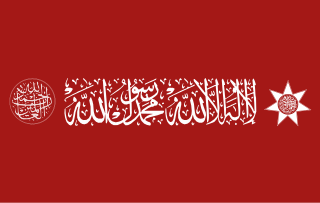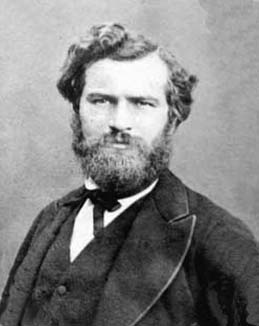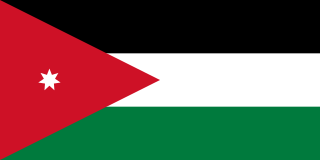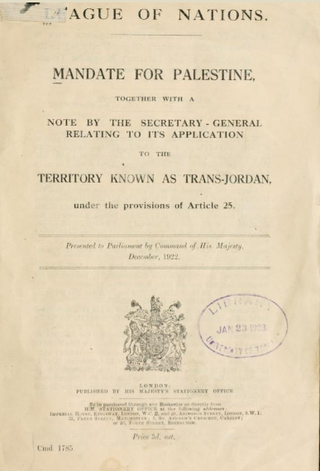
The San Remo conference was an international meeting of the post-World War I Allied Supreme Council as an outgrowth of the Paris Peace Conference, held at Castle Devachan in Sanremo, Italy, from 19 to 26 April 1920. The San Remo Resolution passed on 25 April 1920 determined the allocation of Class "A" League of Nations mandates for the administration of three then-undefined Ottoman territories in the Middle East: "Palestine", "Syria" and "Mesopotamia". The boundaries of the three territories were "to be determined [at a later date] by the Principal Allied Powers", leaving the status of outlying areas such as Zor and Transjordan unclear.

The Emirate of Transjordan, officially known as the Amirate of Trans-Jordan, was a British protectorate established on 11 April 1921, which remained as such until achieving formal independence in 1946.

The Hashemites, also House of Hashim, are the royal family of Jordan, which they have ruled since 1921, and were the royal family of the kingdoms of Hejaz (1916–1925), Syria (1920), and Iraq (1921–1958). The family had ruled the city of Mecca continuously from the 10th century, frequently as vassals of outside powers, and ruled the thrones of the Hejaz, Syria, Iraq, and Jordan following their World War I alliance with the British Empire.

Marie Ennemond Camille Jordan was a French mathematician, known both for his foundational work in group theory and for his influential Cours d'analyse.

The flag of Jordan, officially adopted on 16 April 1928, is based on the 1916 flag of the Arab Revolt against the Ottoman Empire during World War I. The flag consists of horizontal black, white, and green bands that are connected by a red chevron. The colours are the Pan-Arab Colors, respectively representing the Abbasid, Umayyad, and Fatimid or Rashidun caliphates. The red chevron is for the Hashemite dynasty, and the Arab Revolt.

Count Tadeusz Jordan-Rozwadowski was a Polish military commander, diplomat, and politician, a general of the Austro-Hungarian Army and then the Polish Army.

The Jordanian Armed Forces (JAF), also referred to as the Arab Army, are the military forces of the Hashemite Kingdom of Jordan. They consist of the ground forces, air force, and navy. They are under the direct control of the King of Jordan who is the Supreme Commander of the Jordanian Armed Forces and acts by recommendation of the Defence Minister. The current Chairman of the Joint Chiefs of Staff is Major General Yousef Huneiti, who is also the King's military adviser.

Jordan, officially the Hashemite Kingdom of Jordan, is a country in the Southern Levant region of West Asia. Jordan is bordered by Syria to the north, Iraq to the east, Saudi Arabia to the south, and the occupied Palestinian territory of the West Bank and Israel to the west. The Jordan River, flowing into the Dead Sea, is located along the country's western border. Jordan has a small coastline along the Red Sea in its southwest, separated by the Gulf of Aqaba from Egypt. Amman is Jordan's capital and largest city, as well as the most populous city in the Levant.

Jordan–Syria relations are bilateral relations between the sovereign states of Jordan and Syria. Relations between neighbours have ancient roots as both countries are historically parts of the Levant or Greater Syria. The two states were created after the First World War from former Ottoman dominions by way of a secret bilateral agreement between Britain and France.
William Conrad Jordan was an American rower, born in Cleveland, Ohio, who competed in the 1920 Summer Olympics.

The 1920 South Carolina United States Senate election was held on November 2, 1920 to select the U.S. Senator from the state of South Carolina. Incumbent Democratic Senator Ellison D. Smith won the Democratic primary and was unopposed in the general election to win another six-year term.

Sphingini is a tribe of moths of the family Sphingidae. The tribe was described by Pierre André Latreille in 1802.

Smerinthini is a tribe of moths of the family Sphingidae. The genus was erected by Augustus Radcliffe Grote and Herbert C. Robinson in 1865.

This is a survey of the postage stamps and postal history of Jordan, formerly Transjordan.
Litosphingia minettii is a moth of the family Sphingidae. It is known from Malawi and Tanzania.

The Mandate for Palestine was a League of Nations mandate for British administration of the territories of Palestine and Transjordan – which had been part of the Ottoman Empire for four centuries – following the defeat of the Ottoman Empire in World War I. The mandate was assigned to Britain by the San Remo conference in April 1920, after France's concession in the 1918 Clemenceau–Lloyd George Agreement of the previously agreed "international administration" of Palestine under the Sykes–Picot Agreement. Transjordan was added to the mandate after the Arab Kingdom in Damascus was toppled by the French in the Franco-Syrian War. Civil administration began in Palestine and Transjordan in July 1920 and April 1921, respectively, and the mandate was in force from 29 September 1923 to 15 May 1948 and to 25 May 1946 respectively.

The Toll Gate is a 1920 American silent Western film directed by Lambert Hillyer, written by Lambert Hillyer and William S. Hart, and starring William S. Hart, Anna Q. Nilsson, Joseph Singleton, Jack Richardson, and Richard Headrick. It was released on April 15, 1920, by Paramount Pictures.














